On June 9, 2025, the 3rd United Nations Ocean Conference (UNOC3) grandly opened in Nice, France. On the same day, the Global ONCE hosted a Side Event at UNOC3 Blue Zone, launching in-depth discussions on negative emission theories, methodologies, technologies, policies, and industries. Aimed at building a science - technology - policy - industry chain, the event seeks to promote the blue economy, implement the carbon neutrality vision, and address climate change. Peter Thomson, United Nations Secretary-General’s Special Envoy for the Ocean, delivered an opening speech at the side event. Many internationally renowned scientists shared their insights, Alison Clausen, Programme Specialist, Marine Policy and Regional Coordination Section at Intergovernmental Oceanographic Commission -UNESCO, made a concluding speech, and Vice Minister Sun Shuxian awarded Mr. Thomson the title of ONCE Fellow.
Opening Speech by Peter Thomson, United Nations Secretary-General’s Special Envoy for the Ocean
At the opening of the side event, presided over by Professor Jean-Pierre Gattuso from the French National Centre for Scientific Research (CNRS) and President of the "One Ocean Science Conference" (OOSC). Peter Thomson, United Nations Secretary-General’s Special Envoy for the Ocean, delivered a speech. Thomson pointed out that the scientific community's assessment of technological feasibility and risks is the core element to promote the sustainable development of ocean negative carbon emissions (ONCE). He highly affirmed various activities of the Global ONCE during the OOSC, stating that the program has achieved remarkable results and made important contributions to UNOC3, thus expressing gratitude to Global ONCE.
Thomson emphasized that OOSC provides a premise and platform for policymakers to adopt scientific advice, playing a role of scientific support and setting a "scientific foundation" demonstration. He called for future ocean summits to adopt the model of "science conference first, policy discussion later". OOSC will become the standard for future UNOC, marking a milestone to be inscribed in the annals of the United Nations Ocean Conference.
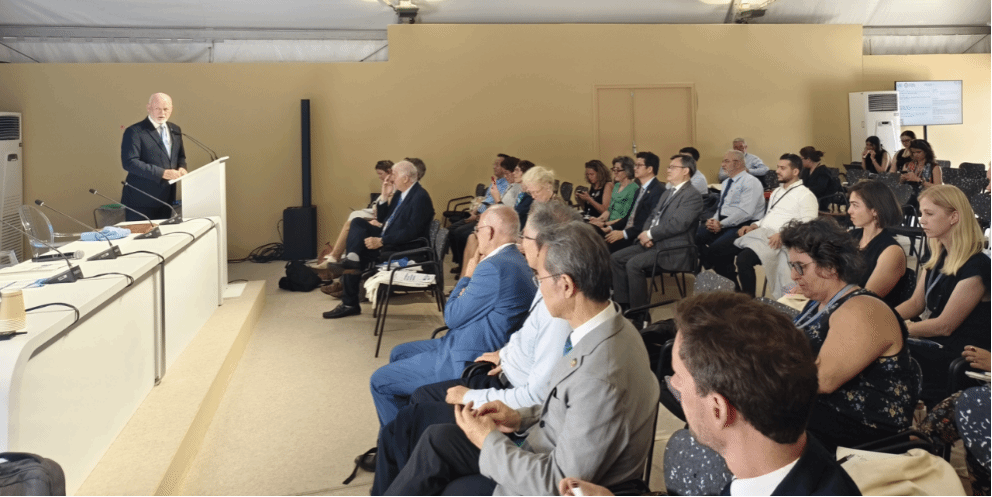
Academician Rong Zhang, Head of Xiamen University, Attends the Global ONCE Side Event and Delivers an Opening Speech
Academician Rong Zhang, Head of Xiamen University, personally attended the Global ONCE side event and delivered an opening speech. He appreciated the important scientific support role of the OOSC conference previously hosted by scientists and expressed firm support for Global ONCE and OOSC, thanking the French side, as the host country, for its efforts and contributions.
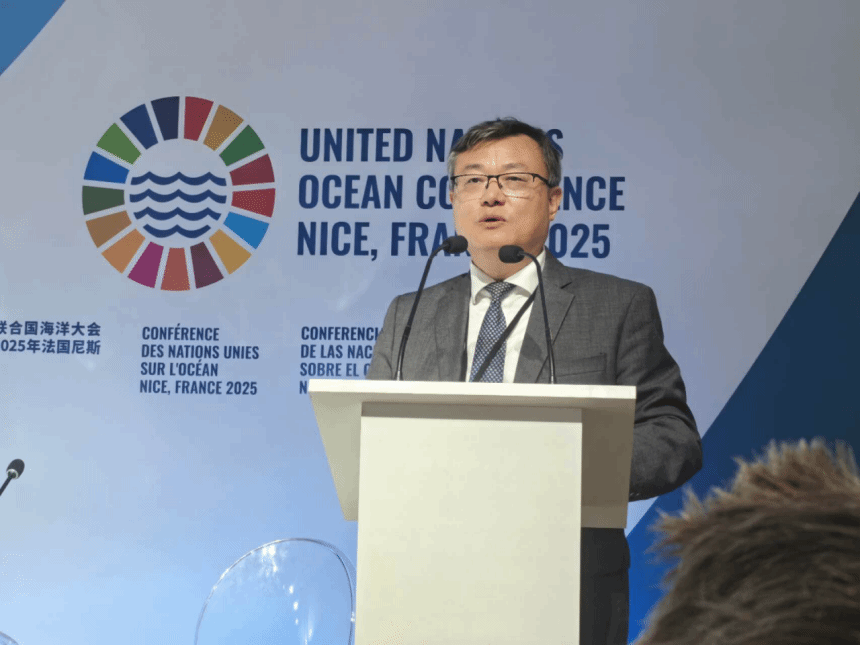
Signing of MOU and Joint Release of the Conference Declaration
The Global ONCE signed Memorandum of Understanding (MOU) with the organizers of the OOSC conference, the organizers of UNOC3, and two authoritative French marine institutions – the French National Centre for Scientific Research (CNRS) and the French Research Institute for Exploitation of the Sea (IFREMER). As a gold partner, the Global ONCE, together with CNRS and IFREMER, issued an initiative during OOSC, calling on the scientific community to reach a consensus, which contributed to the release of the OOSC Manifesto at the conference closing ceremony. Focusing on marine scientific actions, the OOSC Manifesto emphasizes scientific evidence and proposes specific measures in clarifying action directions, accumulating knowledge in advance, and transforming knowledge into practical actions. It aims to promote marine protection and sustainable development, providing practical guidance for the improvement of the global ocean governance system and the international collaborative development of marine science.
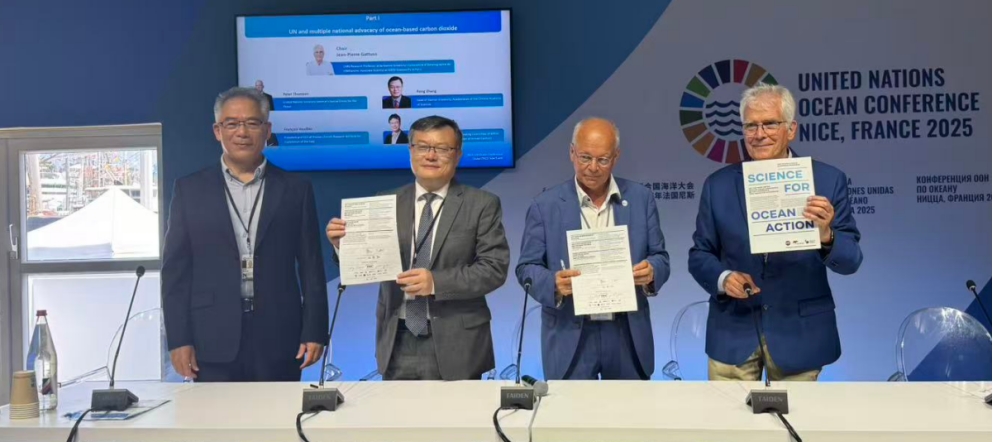
Representatives of UNOC3 organizers, Co-Chairs of the OOSC Conference Jean-Pirrer Gattuso (1st from right, Academician of the European Academy of Sciences) and François Houllier (2nd from right, Director of the French Research Institute for Exploitation of the Sea) attended the Global ONCE Blue Zone Side Event and presented a Certificate of Contribution to the Global ONCE(3rd from right is Zhang Rong, Head of Xiamen University; 4th from right is Academician Jiao Nianzhi)
From Scientific Research to Governance Practice: Scientists Share Insights
In the scientific report session, Academician Nianzhi Jiao and Academician Jean-Pierre Gattuso delivered keynote speeches first. Academician Nianzhi Jiao expounded on the technical path of the Global ONCE, introduced the progress of the ISO International Standard Working Group led by Global ONCE in the standard construction of the negative emission field, pointed out the current deficiencies in marine policy standards, and called for "Science-based Policymaking, Policymaking for Scientific development, Scientific development for Society".
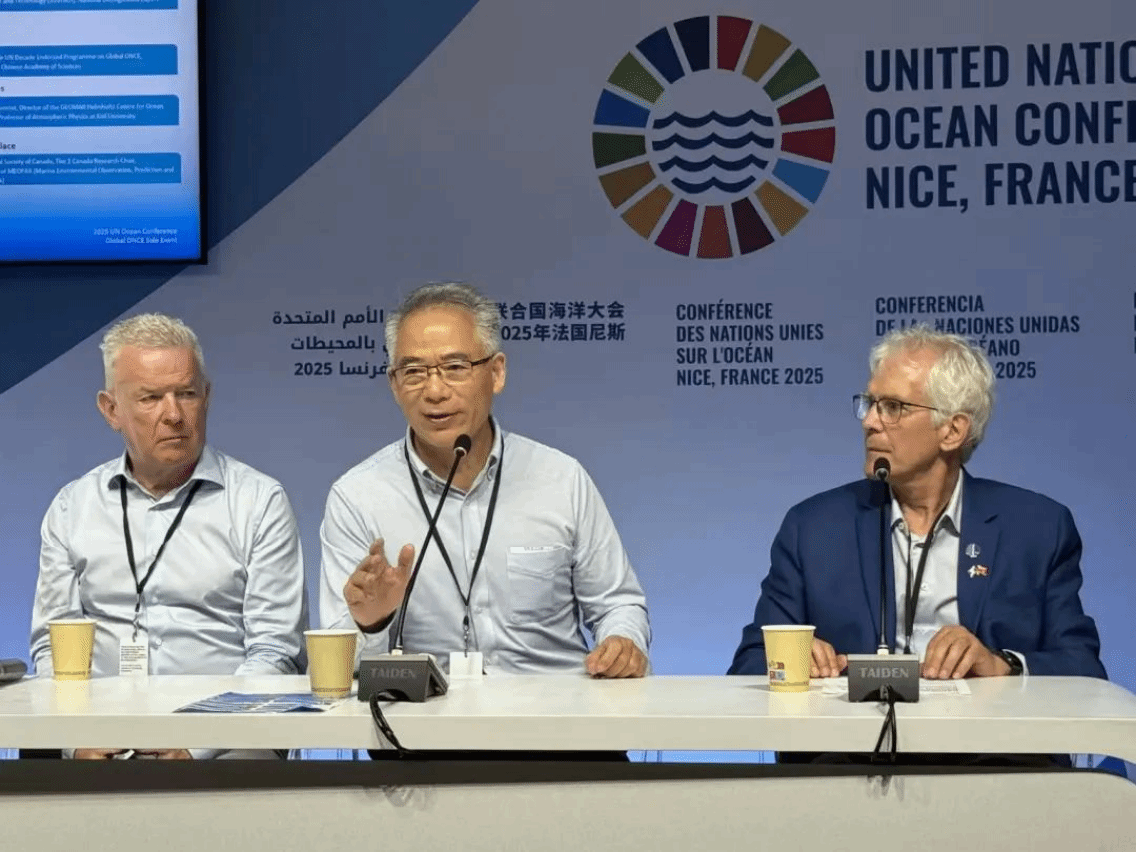
Subsequently, in his report, Academician Gattuso explained the core role of marine Carbon Dioxide Removal (mCDR) technology in enhancing natural carbon sinks and its key value in keeping the global temperature rise within 2°C and striving to limit it to the 1.5°C target. Professor Philip Boyd from the University of Tasmania proposed that the ocean is the "blue frontier of carbon dioxide removal", emphasizing the concept of building a "One-Earth CDR (Carbon Dioxide Removal)" through land-ocean integration, and calling for the development of diverse, robust, verifiable, and scalable carbon dioxide removal methods. Professor Kajta Matthes, Director of the GEOMAR Helmholtz Centre for Ocean Research Kiel, introduced Germany's research in three aspects: submarine geological carbon storage, artificial ocean alkalinization, and seagrass carbon sinks, emphasizing the importance of advancing policy formulation and scientific research simultaneously. Douglas Wallace from Dalhousie University in Canada took the Canadian marine alkalinization pilot project as an example to propose the "Living Lab" model, which brings together enterprises, academia, and communities in specific marine areas to advance research, emphasizing that the parallel development of independent scientific research and enterprise practice is crucial for transforming ONCE from theory to practice.
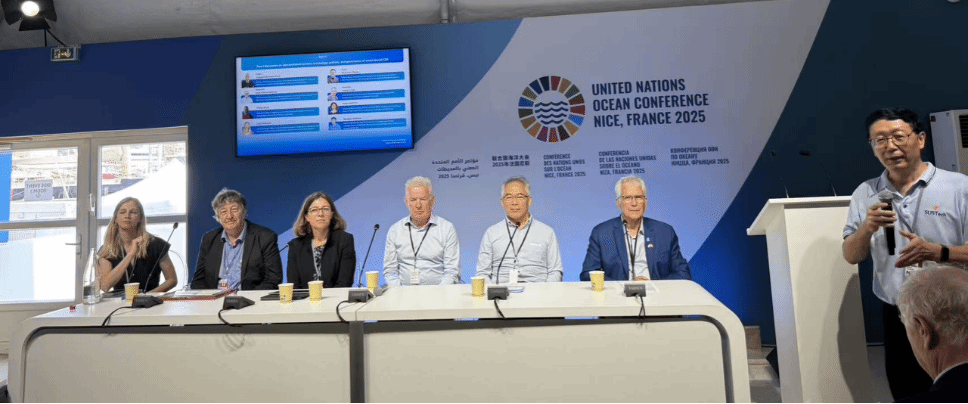

Professor Chuanlun Zhang, Director for International Collaborations of Global ONCE, chaired the panel discussion session. Gattuso warned that although progress has been made in ONCE research, the speed is insufficient, and the effectiveness of technologies still has uncertainties. The "governance gap" is the most urgent problem to be solved, calling for the urgent improvement of international policy norms. The conference finally reached a consensus: mCDR is a key path to achieve carbon neutrality, requiring strengthened basic research, standardized experimental processes, enhanced monitoring and verification capabilities, and the construction of unified governance rules based on the framework of international law to ensure that scientific achievements are translated into practical climate actions.
Building a Bridge of "Science-Technology - Policy - Society" to Promote Cross-Sectoral Collaborative Development
Academician Nianzhi Jiao, Chief Scientist of the Global ONCE Program, proposed the "SP-PS-SS" concept at the meeting, namely, "Science-based Policymaking, Policymaking for Scientific Development, Scientific Development for Society". Following the SP-PS-SS concept, the Global ONCE signed Memorandum of Understanding with institutions such as the International Platform for Ocean Sustainability (IPOS), the University of California, Santa Cruz (UCSC), Peace Boat, and the Equator Fund, strengthening cross-disciplinary collaboration between the scientific community, enterprises, and non-governmental organizations to jointly address climate change.
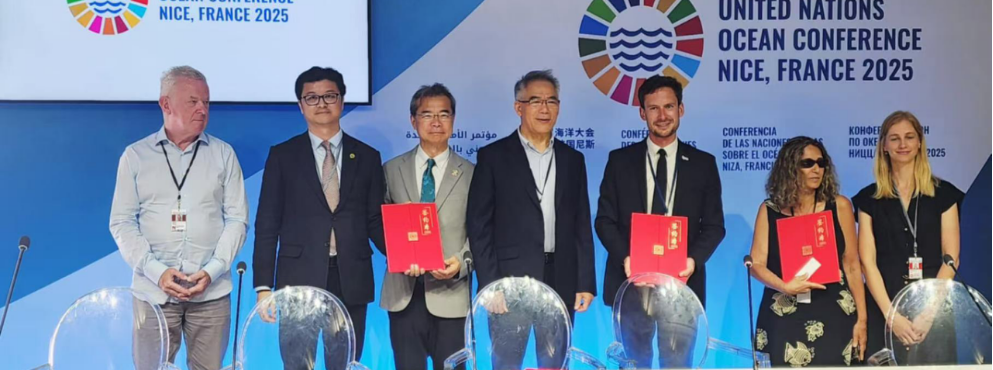
Awarding ONCE Fellow to Carry Forward the Spirit of Scientific and Technological Innovation Leadership
As an incentive system, the ONCE Fellow is the highest honor awarded by the Global ONCE to its members, aiming to commend winners for their outstanding achievements in marine carbon sink technology breakthroughs, negative emission theoretical innovations, and promotion of international cooperation. By setting benchmark examples, it inspires more global forces to engage in ocean negative carbon emission research and accelerate the construction of ocean solutions to address climate change. Following the awarding of the first batch of fellows in 2024, the Global ONCE awarded ONCE Fellow titles to experts, scholars, policymakers, and industry leaders who have made outstanding contributions to promoting the concept of ONCE, scientific and technological research and development, policy advice, and industrial linkage at this United Nations Ocean Conference. So far, more than a dozen Global ONCE members, including two Nobel laureates, have received this honor.
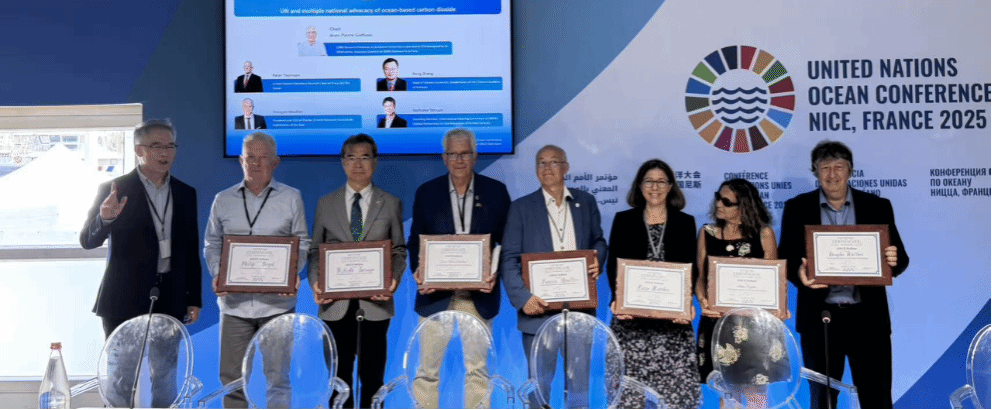
Implementing Ocean Negative Carbon Emission Action Plans to Promote International Carbon Neutrality Governance
Alison Clausen concluded that the meeting provided key scientific and technological support for global ocean negative carbon emission actions. Sun Shuxian, Vice Minister of the Ministry of Natural Resources of China, said that the meeting was of great significance for marine scientific research cooperation and policy formulation. This side event marks a key leap in the field of ONCE from technological research and development to international collaborative governance. By constructing a chain of "scientific theory - policy transformation - engineering practice", it promotes ONCE from scientific concepts to global practical actions, providing important support for global climate governance and the construction of a community with a shared future for mankind.
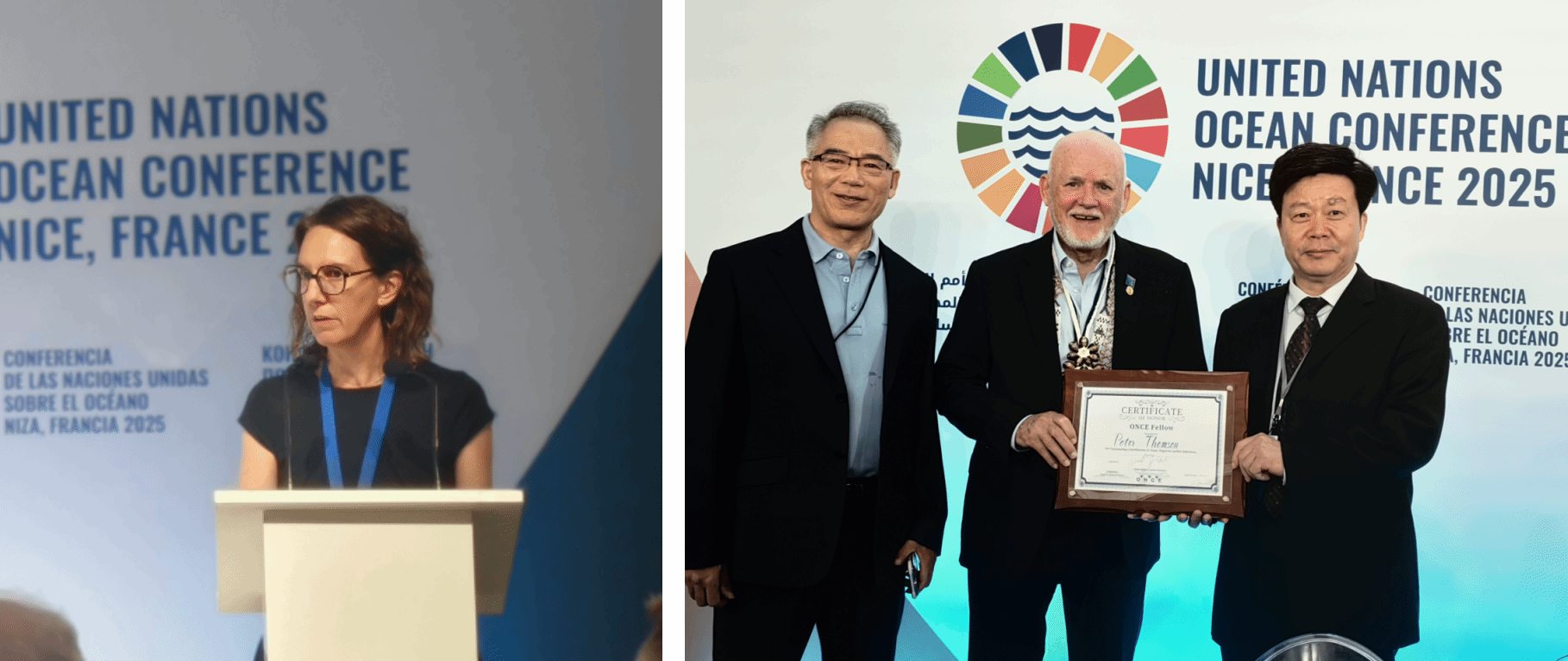
(The UNOC3 gathered more than 30,000 people from the marine scientific community, economic circles, international organization representatives, and the public. Heads of state or government from more than 100 countries participated, making it the largest ocean event in history.)